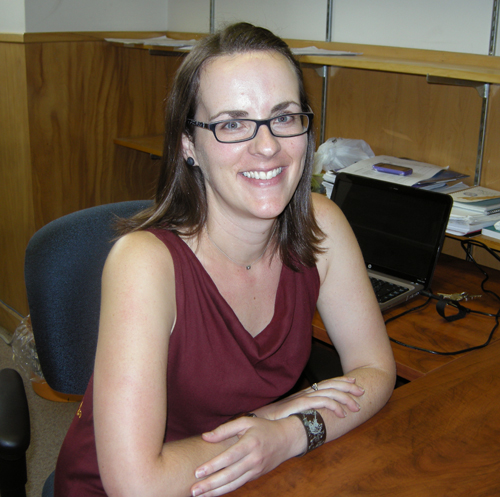
The University of Guelph isn’t located near the ocean, yet geography professor Jennifer Silver considers it an excellent base for her research on fish farming and its effects on people and communities.
“Guelph is known for its research on agriculture and food security, and aquaculture is just food production in the water instead of on land,” Silver points out. “It’s also directly related to the new program in environmental governance offered here, which I’ll be involved in. We’re interested in taking a broader look at the ways that we interact with and manage the environment, including fresh water and oceans.”
Silver grew up in Dartmouth, N.S., and as a child learned to appreciate the “values and relationships people have with nature, and the work they do to collect resources.” Geography was her favourite subject in high school, and she did her undergrad work in geography and environmental science at Mount Allison University, then her master’s at the University of Western Ontario before completing her PhD at Simon Fraser University.
While at Western, Silver was involved in a project in the Turks and Caicos Islands to assess Caribbean sea turtle populations and the potential implications of a local, legal turtle fishery. “I wondered why the fishermen were willing to take part in our project even though it might lead to changes for them,” she says. “When I talked to them, they had a great sense of the resource and talked about wanting the best management of the turtles.” The oceans are undergoing massive changes, and these changes are often felt most directly by people who live on the coast and rely on marine resources, Silver adds.
At Simon Fraser, Silver says she stepped a short distance away from geography to study in the School of Resource and Environmental Management. “I wanted the different perspectives offered by ecology and economics, but I tailored my PhD work so it would be geography.”
To look further at the issues that intrigued her, Silver conducted fieldwork in a reserve-based First Nations community called Kyuquot on the west coast of Vancouver Island. Kyuquot had received government funding and support to begin farming shellfish.
“The shellfish business introduced many new challenges,” says Silver. “There was a lot to learn about the technology and new social and economic relationships that had to be developed, such as those with companies that sold them baby shellfish.” In addition, there were tensions between maintaining opportunities to harvest wild-growing shellfish and passing that tradition and knowledge through generations, and pursuing the potential economic rewards that shellfish farming was said to offer.
Silver sought to document some of the diverse, non-economic values gained through the harvest of wild-growing shellfish, as these had been missed in the original promotion of shellfish farming.
While some shellfish farms on the east coast of Vancouver Island had done well, the Kyoquot business was ultimately operating in a different ecological and socioeconomic context. “The conditions are different on the west coast,” Silver points out. “The water is colder, and it is a much longer trip to the markets where the shellfish will be sold.” Getting to Kyoquot from Vancouver, for example, requires a full day of travel.
Silver stayed on the reserve for three periods of three months each. “The people were so lovely to me,” she says.
She’s now approaching the topic from a different perspective: Her current research looks at how Canadian seafood is marketed, the consumer perceptions of seafood, and whether consumers are interested in or affected by sustainability issues. “There is a lot of talk in the media about sustainability,” says Silver. “I’m interested in knowing what consumers think about it and what affects that understanding.” This research began through a SSHRC-funded post-doctoral fellowship, which Silver held last year at the Duke University Marine Laboratory.
She also wants to understand more about the shift from fishing in the wild towards aquaculture, and how this change can bring tension to existing social and economic relationships. “It’s important to understand the political-economic dynamics that underlie this shift,” she says. Silver points to the controversies surrounding the farming of salmon in British Columbia, which started in the 1970s. At first, there were just some local fish farmers with small operations. Then investors from Norway started larger fish farms and brought in Atlantic salmon. Locals voiced opposition because they worried that Atlantic salmon might escape and start breeding with wild Pacific salmon. Although that concern seems to be less prominent, there is now controversy surrounding sea lice. These parasites can be found on farmed fish, and there is concern that they may spread to wild salmon as well.
“Yet, this industry adds millions to the B.C. economy, so there’s not one simple answer.”
Such tension may exist in Ontario, too. Silver notes that the Great Lakes also have aquaculture sites, mostly for rainbow trout.